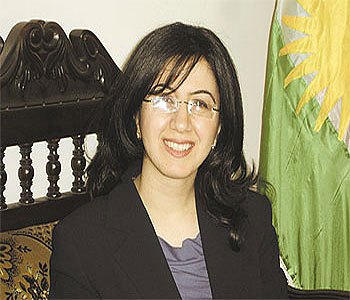
Chinar Saad Abdullah (Asharq Al-Awsat Photo by Ma’ad Fayad)
Irbil, Asharq Al-Awsat – Much like the eucalyptus tree, after which she is named, Chinar Saad Abdullah, is strong-willed, elegant and steadfast as she seeks to achieve her objective and help those around her.
The Minister for Martyrs and Victims of the Anfal campaign in the Kurdistan regional government, the youngest government official at only 32, met with Asharq Al Awsat in her office in Irbil. The member of Kurdistan’s national assembly insisted on being addressed by her first name. “I want every one to act normal around me,” she said.
More than 180,000 Iraqi Kurds died in the Anfal campaign, which took place between 1986 and 1989. Headed by Ali Hassan al Majid, also known as Chemical Ali, the campaign included the use of chemical weapons against civilians. In the city of Halabja, more than 5,000 civilians died in March 1988 after Iraqi troops dropped poison gas on the Kurdish town.
Born in the northern Iraqi city, Chinar revealed her family had to flee to Iran to escape Saddam Hussein’s crackdown on Iraqi Kurds. “My father was in the Peshmerga (Kurdish militias) and we had to flee to Iran. I studied there until we returned after the revolution in 1991.”
Before being elected to the regional parliament, Chinar used to work “with students and youths in the Arts Faculty at Salaheddin University in Irbil, as well as with women’s groups. We published a newspaper and held conferences and organized several trips.”
The voice of Kurdistan’s young population in parliament, Chinar was encouraged by her friends and family to “represent Kurdish youths in the national assembly.”
“I was confident I would be elected because I have a strong will and personality. I have clear objectives to serve young people and women and I usually consult those older than me. I am confident I will succeed.”
When appointed to the Kurdish cabinet, Chinar did not celebrate. “I wanted to remain in parliament and work amongst my constituency. I can assist others through any position. However, as long as I was selected by Prime Minister Nechirvan Barzani, I have to succeed because my success means young people and women have triumphed. I will open the way for young people to take part in leadership positions.”
With a high percentage of Iraqi Kurds under 25 “young people have an important role to play. The older generation has had its chance in politics and should give young people the chance to succeed,” the cabinet minister said.
As to whether her political career had brought romantic success, Chinar laughed and said, “On the contrary, men now are scared of me. They believe that I will only marry a minister or Member of Parliament.” “I have always been busy studying and working to help young people and women. As a minister, I have no time for my family or for family visits and let alone any romantic involvement. Some people say I am just young and excited. I want to prove myself to these people and show them I am capable of succeeding.”
The death of her father in a suicide attack in the headquarters of the Kurdistan Democratic Party in 2003 spurred the young official to assist survivors of the Anfal campaign.
Every morning, Chinar meets with dozens of widows and the children of victims of Saddam Hussein’s campaign as they wait to receive financial aid. Describing her work, the minister said, “I meet the families with a smile. They need moral support more than financial aid. We need to make them happy. I myself am the daughter of a martyr and my mother is a widow. I share the families’ feelings and I strongly belong to them.”
Explaining her work philosophy, the Kurdish official described how, “From the day I was appointed, I held a meeting with all the employees in the ministry. I told them, “Let us forget about our ranks. We are all one team and there is no difference between one individual and another.”
Chinar is currently busy carrying out a number of studies to establish the exact number of Kurdish civilians and fighters killed in Saddam Hussein’s campaign. “38,000 died at the front and more than 80,000 died during the Anfal. Many were also buried in mass graves.”
A typical day for the young minister consists of “working for very long hours and returning home very late. I have less time to see my mother and attend family and social occasions. I barely have any time to stand in front of the mirror. I have work clothes and outfits for special occasions. I have to dress appropriately for the ministry, which is a problem. I have always preferred wearing jeans and a t-shirt. I will try to return to my life as I want it.”
Summarizing her philosophy, Chinar said, “I have to change the post and not let it change me.”
